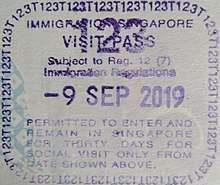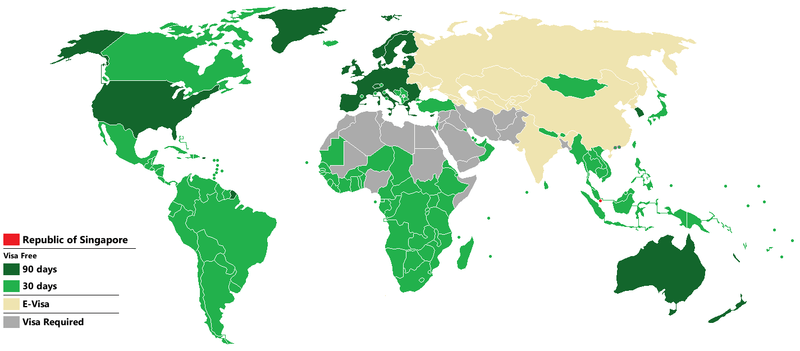Visa policy of Singapore
The visa policy of Singapore deals with the requirements that a foreign national wishing to enter Singapore must meet to obtain a visa, which is a permit to travel, to enter and remain in the country. A visa may also entitle the visa holder to other privileges, such as a right to work, study, etc. and may be subject to conditions.[1]
 |
|---|
| This article is part of a series on the politics and government of Singapore |
|
|
|
Related topics |
|
|

A citizen of one of the visa waiver eligible countries and territories can temporarily enter the country for a period of 30 days or 90 days without a visa depending on their nationality; however some visitors must first obtain a visa in advance before being allowed to enter Singapore if they wish to stay for a longer period of time.[1][2] Countries whose citizens require a visa to enter Singapore are categorized into countries eligible to apply for an electronic visa and countries whose citizens need a visa in advance.
Applications of visitor visas, work permits, study permits and certain types of permanent residency can be submitted online. However, such applicants must provide their biometrics (photograph and fingerprints) as a part of their application process. Depending on the country by which the passport was issued, a visa application may have to be submitted at a visa application centre at a Singaporean diplomatic mission.[1]
Entry requirements
All visitors to Singapore must:
- hold a passport or a travel document valid for more than 6 months at the time of departure,[3]
- hold an onward or return ticket;[3]
- have sufficient funds for the duration of stay in Singapore;[3]
- have submitted an electronic SG Arrival Card[4] online (while abroad) or at various electronic booths at the port of entry;[5] it is advised that the SG Arrival Card is submitted while abroad, to avoid unnecessary queues at the point of entry.
- have entry documents (including a visa if required) to their next destination (if applicable);[3]
- have a visa and/or a yellow fever vaccination certificate for entry into Singapore (if applicable).[3]
Visa policy map

Visa-free
All citizens from any country included in neither the Assessment Level I nor the Assessment Level II lists are allowed a maximum stay of 30 days without a visa in Singapore, except the holders of the following passports who are allowed to stay in Singapore for up to 90 days:[2]
1 - Visa-free entry for British passport holders without proof of right of abode in the United Kingdom is shortened to 30 days.
Holders of ![]()
Visa required
Singapore groups visa requiring nationals into two groups – Assessment Level I and Assessment Level II countries.
Assessment Level I Countries
Holders of normal passports or travel documents issued by the following countries and territories may obtain a visa online through a local Singaporean contact or a strategic partner in Singapore, or at the nearest Singaporean diplomatic mission or one of its authorized visa agents outside Singapore. Visa will normally be issued in 1 working day, and the applicant can travel with a printout of the e-visa. Visa requirement does not apply to holders of non-ordinary passports of these countries except North Korea.[1][2]
Assessment Level II Countries

Citizens of the following countries must obtain a visa in advance. They may apply for a visa through a local Singaporean contact or a strategic partner in Singapore, or at the nearest Singaporean diplomatic mission or one of its authorized visa agents outside Singapore. Visa will normally be issued in 3 working days, and a visa vignette is affixed on the applicant's passport.[1][2]
- Holders of temporary passports issued by the

- Holders of refugee travel documents issued by any Middle-East country
- Stateless persons (a holder of an alien's passport, such as certificate of identity and refugee travel document, is considered as stateless by ICA, regardless of the nationality appearing on the holder's travel document)
Non-ordinary passports
Of the non-ordinary passport holders of Assessment Level II countries, visa requirement does not apply to holders of diplomatic or official/service passports of Bangladesh, Jordan, Tunisia and of diplomatic passports of Saudi Arabia and Morocco.[1]
Frequent Traveller Programme
The Frequent Traveller Programme allows eligible travellers to enjoy convenient immigration clearance via automated clearance facilities – also known as the enhanced-Immigration Automated Clearance System (eIACS) – at some Singapore Checkpoints.[9]
To enroll in the programme, the traveller must have visited Singapore at least 2 times previously within the last 24 months.[9] Enrolling into the programme is free of charge.[9]
Holders of passports issued by the following countries are allowed to enroll into the Frequent Traveller Programme:[9]
|
|
a - Only British citizens are eligible for enrollment.
APEC Business Travel Card
Holders of passports issued by the following countries who also possess an APEC Business Travel Card (ABTC) containing the "SGP" code on the reverse, which indicates that it is valid for travel to Singapore, can enter Singapore without a visa for business trips for up to 60 days, unless otherwise stated.[2] They are also eligible for enrollment into the Frequent Traveller Programme.
ABTCs are issued to nationals of:[10]
Visa-free transit
Nationals of Assessment Level I and II countries do not require a visa to transit through Singapore Changi Airport as long as they fulfill the following requirements:[11]
- have an onward ticket,
- remain in the transit area,
- have their luggage checked to their final destination,
- do not clear immigration to enter Singapore, and,
- are not travelling on a low-cost airline (except for passengers travelling on Scoot with Scoot-thru, or Jetstar with connecting flights purchased on the same booking).
Nationals of certain Assessment Level I countries may enter Singapore under the Visa Free Transit Facility.
Visa Free Transit Facility (VFTF)
Nationals of India or China
Nationals of ![]()
![]()
Single journey visas issued by these eight countries are also acceptable for transit, but if using the VFTF on the return journey (i.e. after the single journey visa has been used) the traveller must travel directly from the visa-issuing country and directly back to the home country, and the traveller must have not returned to their home country since the single journey visa was last used.
They may enter Singapore by any mode of transport but must depart by air or sea.[12] They must have a valid onward air/ferry/cruise ticket departing Singapore within 96 hours.[12]
Nationals of the CIS, Georgia, Turkmenistan and Ukraine
Nationals of the following countries may enter Singapore without a visa for 96 hours if they are in transit to or from any third country. These nationals may use the VFTF on both the forward and the return journey. They may enter Singapore by any mode of transport but must depart by air.[12]
Mandatory yellow fever vaccination
All travellers, including Singapore residents, who arrive in Singapore from countries with risk of yellow fever transmission (listed below) require an International Certificate of Vaccination in order to enter Singapore.[13] Failure to provide a valid yellow fever vaccination certificate, would result in the traveller being quarantined under Section 31 of the Infectious Disease Act, for a maximum of six days upon arrival in Singapore.[13] Non-residents who object to the quarantine, will be denied entry and returned to his/her place of origin or last port of embarkation.[13] The vaccination requirement is imposed by this country for protection against Yellow Fever since the principal mosquito vector Aedes aegypti is present in its territory.[14][15]
SG Arrival Card
Prior to entering Singapore, all foreign visitors (including travellers enrolled in the Frequent Traveller Programme) are required to submit an SG Arrival Card online, which provides personal information, trip details and health declaration, to Singapore immigration.[4]
The electronic SG Arrival Card must be submitted within three days prior to the date of arrival in Singapore, to avoid unnecessary delays during immigration clearance.[4]
Foreign visitors can submit their personal information and trip details via an official link or via the "SG Arrival Card" mobile application from either the App Store (iOS) or Google Play (Android).[4]
The Electronic Arrival Card is free of charge. The Electronic Arrival Card is not a substitute for a visa.[4]
The paper-based Disembarkation Card has been discontinued. [16]
COVID-19 pandemic
Due to the COVID-19 pandemic, all short-term visitors are not allowed to enter or transit through Singapore effective 23 March 2020, 2359 hours.[1][2][17]
From 29 March 2020, 2359 hours, all Singapore long-term pass holders, as well as those granted in-principle approval for long-term passes, are required to obtain an entry approval from the relevant government agency (Immigration and Checkpoints Authority, Ministry of Education or Ministry of Manpower) before commencing their journey to Singapore. All travellers will need to submit a health and travel declaration online prior to arrival, and will be issued a 14-day stay home notice upon arrival.[18]
Statistics
Most visitors arriving to Singapore on short-term basis were from the following countries of nationality:[19]
| Country or territory | 2018 | 2017 | 2016 | 2015 | 2014 | 2013 | 2012 | 2011 |
|---|---|---|---|---|---|---|---|---|
| 3,416,475 | 3,226,929 | 2,863,582 | 2,106,164 | 1,722,380 | 2,269,870 | 2,034,177 | 1,577,522 | |
| 3,021,429 | 2,954,384 | 2,893,614 | 2,731,690 | 3,025,178 | 3,088,859 | 2,837,537 | 2,592,222 | |
| 1,442,242 | 1,272,069 | 1,097,186 | 1,013,986 | 943,636 | 933,553 | 894,993 | 868,991 | |
| 1,253,992 | 1,168,356 | 1,151,480 | 1,171,077 | 1,233,035 | 1,280,942 | 1,231,686 | 1,140,935 | |
| 1,107,215 | 1,081,987 | 1,027,309 | 1,043,568 | 1,074,878 | 1,125,179 | 1,050,373 | 956,039 | |
| 829,664 | 792,813 | 783,721 | 789,179 | 824,741 | 832,845 | 757,116 | 656,417 | |
| 778,135 | 736,456 | 691,555 | 673,374 | 676,481 | 687,794 | 656,804 | 677,723 | |
| 643,162 | 565,250 | 516,276 | 499,509 | 484,912 | 491,946 | 477,213 | 440,576 | |
| 629,451 | 631,359 | 566,503 | 577,082 | 536,975 | 471,768 | 445,184 | 414,879 | |
| 591,600 | 531,359 | 469,409 | 418,266 | 424,408 | 380,495 | 366,234 | 332,231 | |
| 588,863 | 518,903 | 489,205 | 473,810 | 451,931 | 461,459 | 446,497 | 442,611 | |
| 545,601 | 531,307 | 546,384 | 516,409 | 506,509 | 497,409 | 477,654 | 472,708 | |
| 473,113 | 465,769 | 537,964 | 609,888 | 631,029 | 539,810 | 472,167 | 464,375 | |
| 422,935 | 395,549 | 394,173 | 378,026 | 337,431 | 350,308 | 282,203 | 238,488 | |
| 356,797 | 342,336 | 328,762 | 286,732 | 263,513 | 251,560 | 252,433 | 219,952 | |
| Total | 18,506,619 | 17,422,826 | 16,402,593 | 15,231,469 | 15,095,152 | 15,567,923 | 14,496,091 | 13,171,303 |
References
- "ICA | Check if You Need an Entry Visa". www.ica.gov.sg. Immigration & Checkpoints Authority. 2020. Retrieved 30 January 2020.
- "Country information (visa section)". Timatic. International Air Transport Association (IATA) through Olympic Air.
- "Entry Requirements". Immigration & Checkpoints Authority, Singapore. 27 September 2019. Retrieved 15 January 2020.
- "SG Arrival Card". Immigration & Checkpoints Authority, Singapore. 23 March 2020. Retrieved 25 March 2020.
- "Coronavirus: All travellers arriving in Singapore must submit health declaration from Friday". The Straits Times. 2020-03-23. Retrieved 2020-03-25.
- https://www.beehive.govt.nz/release/closer-economic-partnership-singapore-comes-force-1-january
- Passport Information
- CNA (21 November 2019). "No visa required for Hong Kong passport holders to enter Singapore, ICA clarifies". CNA. CNA. Retrieved 21 November 2019.
- "ICA | Frequent Traveller Programme". www.ica.gov.sg. Retrieved 2020-01-13.
- "ABTC Summary". Travel@APEC. Archived from the original on 19 October 2016. Retrieved 20 January 2017.
- Flight transfer
- "Visa Free Transit Facility". Retrieved 3 February 2019.
- "ICA | Yellow Fever Vaccination Certificate". www.ica.gov.sg. Retrieved 2020-03-28.
- "Countries with risk of yellow fever transmission and countries requiring yellow fever vaccination" (PDF). World Health Organization, International Travel and Health. June 17, 2014. Retrieved March 29, 2020.
- "Yellow Fever Vaccination Certificate". Retrieved 2017-10-31.
- "Coronavirus: All travellers arriving in Singapore must submit health declaration from Friday". The Straits Times. 2020-03-23. Retrieved 2020-03-25.
- Tang, See Kit; Tjendro, Johannes (22 March 2020). "No entry or transit through Singapore for all short-term visitors amid heightened risk of imported COVID-19 cases: MOH". Channel NewsAsia. Retrieved 9 May 2020.
- "COVID-19: Entry approval required for all long-term pass holders entering Singapore". Channel NewsAsia. 28 March 2020. Retrieved 9 May 2020.
- "International Visitor Arrivals". Singapore Tourism Board. Archived from the original on January 22, 2017. Retrieved March 6, 2018.
- Excludes Malaysian citizens arriving by land.